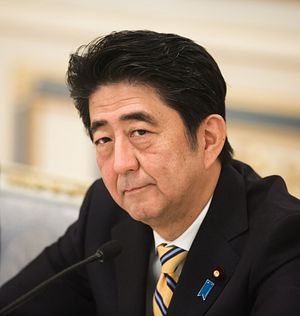Japanese Prime Minister Shinzo Abe spent part of Thursday in the Mongolian capital, Ulaanbaatar, before heading off to Central Asia. Abe will spend the next week visiting capitals throughout the region with an entourage of Japanese business representatives looking to secure around two trillion yen ($16.5 billion) in deals. He’s the first Japanese Prime Minister to visit the former Soviet republics since Junichiro Koizumi traveled to Kazakhstan and Uzbekistan in 2006. Abe was last in Mongolia in 2013.
Although the Mongolian leg of Abe’s tour lasted only a few hours, it set the tone of the trip–emphasis on what Japan can bring to the region in terms of investment and expertise. Earlier this year, Japan and Mongolia signed an economic partnership agreement set to remove most tariffs between the two countries over the next decade and smooth the path for increased trade and exchange. Mongolia–sandwiched between China and Russia–recently declared its neutrality, with President Tsakhiagiin Elbegdorj writing in September that “Mongolia’s neutrality is delicately reflected in the very letter and spirit of the agreements and treaties we concluded with our neighboring states.” The speaker of the Mongolian parliament, Zandaakhuu Enkhbold, called Japan the country’s “Third Neighbor.”
“Third Neighbor” is a perfect description of what Japan hopes to be for Central Asia as well.
What Japan brings to the region, in contrast to China or Russia, is absent many of the tensions big countries have with small neighbors–disputes over borders, creeping geopolitical influence, meddling politics, and more. Central Asia exports its gas and oil either via Russia or China, but there are numerous pipeline projects and untapped fields that stand to benefit from Japanese technical expertise. Moreover, Japan can–and does–invest in projects Russia and China either can’t or won’t.
Although Kazakhstan is the last stop on Abe’s regional tour–it is perhaps the most important. In Astana, Abe will outline Japan’s Central Asia policy. Japan has no hope, and probably no desire, to supplant Russian or Chinese influence in the region. But, Japan looks willing to step in as another option, in addition to bringing to the region a high degree of technical expertise and experience.
Turkmenistan is illustrative in this respect. In July, Turkmenistan sent an official delegation to Tokyo to discuss increasing Japanese investments in the country. Much of this investment has focused on the port of Turkmenbashi on the Caspian. Turkmenistan’s economy, it has been noted often here, is almost entirely dependent on the energy trade. And while gas sales to Russia have declined in the last decade, China has more than compensated, to the point that Turkmenistan is now virtually dependent on the Chinese market. China accounts for 80 percent of Turkmenistan’s exports.
Tokyo’s investments concentrate not just on energy resource extraction, but on converting hydrocarbon resources to high-value-added goods such as plastics and chemicals. For example, facility to produce two types of plastic from hydrocarbons began construction last year outside Turkmenbashi. According to Akipress, the project is worth $3 billion and will be implemented in part by Japan’s Toyo Engineering Corporation. Five Japanese companies plan to complete an agreement to build a purification plant at the Galkynysh gas field worth $8.3 billion (1 trillion yen), which will be funded in part by Japanese banks. In Uzbekistan two Mitsubishi companies are expected to settle a deal with 110 billion yen to construct a plant to convert natural gas into fertilizer.
In Kazakhstan, Japan hopes to capitalize on the two countries’ shared commitment to nonproliferation and emphasize Tokyo’s expertise and experience with nuclear power technology. According to the Nikkei Asian Review, Toshiba and a number of other Japanese companies are in the running for a contract to build a new nuclear power plant in Kazakhstan. The Kazakh president’s press office, as reported by Tengrinews, said that the nuclear industry and green technology are top items on the agenda, as well as joint projects in manufacturing and hydrocarbon processing.
Kyrgyzstan and Tajikistan, which no Japanese leader has ever visited, fall behind their neighbors economically. But although they lack the energy resources which draw Japanese investments to Kazakhstan, Turkmenistan, and Uzbekistan, they will not be completely overlooked even if the style of engagement is different. For Bishkek and Dushanbe, Japan is an alternate investor for their dilapidated transportation networks which China has made great strides in rebuilding.
So how does an island nation partner with one of the most landlocked corners of the globe? By walking the paths already established by China and Russia–infrastructure and energy investments–and likely avoiding the political potholes that have flattened U.S. engagement in the region. Human Rights Watch implored Abe to bring up human rights during his regional tour, but it isn’t clear he will do so in any meaningful way.
































